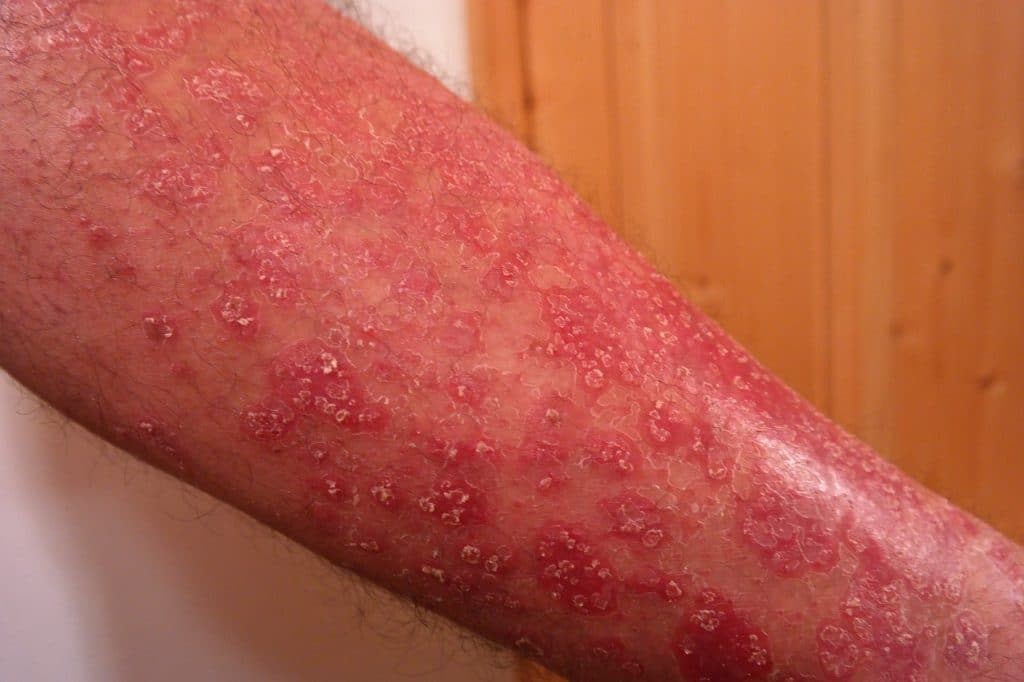Psoriasis is a common skin condition that can lead to irritation, itching, flaking of skin and discomfort. Approximately eight million people in the United States are affected by psoriasis, according to the American Academy of Dermatology.
If you are suffering from psoriasis, you are probably aware that there is currently no cure. However the good news is that there are many different treatment options available to help you manage your symptoms.
Topical Psoriasis Treatments
Many people with limited psoriasis are able to effectively manage their symptoms using creams and lotions that are applied to the skin. In more extensive cases, however, phototherapy or systemic medications may be more appropriate (more on that in a moment).
Common topical psoriasis treatments include:
- Topical Corticosteroids. Topical steroids are the most commonly prescribed topical treatment for psoriasis. Topical corticosteroids are effective in reducing inflammation and relieving itching.Mild corticosteroid topicals are often used for treating sensitive areas like skin folds or facial skin.It is important to recognize that topical corticosteroids alone are not recommended for long-term use because they can potentially cause unwanted side effects or stop working altogether.
- Topical Vitamin D Analogues. Topical calcipotriene is an example of a synthetic form of vitamin D3 that is often used in the treatment of psoriasis. It works by slowing the growth of psoriasis, so it is an important component in a topical regimen.
- Topical Retinoids. Tazarotene is a topical vitamin A derivative that can be used to regulate cell growth which can help resolve psoriatic plaques.
Phototherapy Psoriasis Treatments
Phototherapy involves the exposure of skin to certain wavelengths of ultraviolet light. This type of treatment can be performed at a dermatologist’s office or at home using a specialized device. Consistency is key when it comes to phototherapy treatment.
Ultraviolet B (UVB) is a component of natural sunlight that slows the growth of skin cells affected by psoriasis. When treating with UVB light, your skin will be exposed to an artificial UVB light source on a treatment schedule developed by your doctor.
UVB can also be used in combination with other systemic or topical agents to improve its effectiveness. When used with systemic therapies, UVB can become dramatically more effective, even allowing you to use lower doses of your systemic medications.
Psoralen + UVA light (PUVA) – Unlike UVB light, UVA light is relatively ineffective unless it is used in conjunction with a photo-sensitizing medication called psoralen.
Excimer laser is another form of phototherapy that can be used in the treatment of psoriasis. This is a hand held form of Narrowband UVB light that can be used to treat targeted areas of psoriasis, particularly on the scalp.
Oral and Injected Psoriasis Treatments
When your psoriasis is severe or resistant to certain forms of treatment, you may be prescribed oral or injected medications.
- Methotrexate. This is an oral medication that relieves psoriasis symptoms by lowering skin cell production and minimizing inflammation. If you have psoriatic arthritis, it can slow down its development. In higher doses, Methotrexate may lead to a loss of appetite, fatigue, and upset stomach.
- Soriatane (Acetritin). This is an oral retinoid which is a form of vitamin A that is taken in pill form usually once daily. It helps control the speed of cell growth to decrease psoriasis plaque formation.
- Otezla (Apremilast). This is a phosphodiasterase 4 inhibitor which decreases inflammation and helps treat both psoriasis and psoriatic arthritis. It is generally taken as a 30mg tablet twice daily.
- Cyclosporine is a psoriasis treatment that works through the suppression of your immune system and is only meant for short-term use. The medication offers quick relief from psoriasis symptoms, with many patients getting relief within two weeks.The FDA does not recommend the use of cyclosporine for longer than one year, and most providers prefer to limit the use of cyclosporine to less than 6 months.
- Biologics are injectable medications that target specific areas of the immune system that lead to the development of psoriasis. TNF-alpha inhibitors include Enbrel, Humira, Remicaide and Simponi. Interleukin 17-A inhibitors include Cosentyx, Taltz and Siliq. An Interleukin 12/23 inihibitor includes Stelara, and the Interleukin-23 inhibitors include Tremfya and Ilumya. Biologics can be very effective in the treatment of both psoriasis and psoriatic arthritis, but they are not recommended for patients who have problems with their immune systems, active infections or cancer.
If you’re tired of living with uncontrolled psoriasis symptoms, the experts at Anne Arundel Dermatology can help. Click here to schedule an appointment.
































